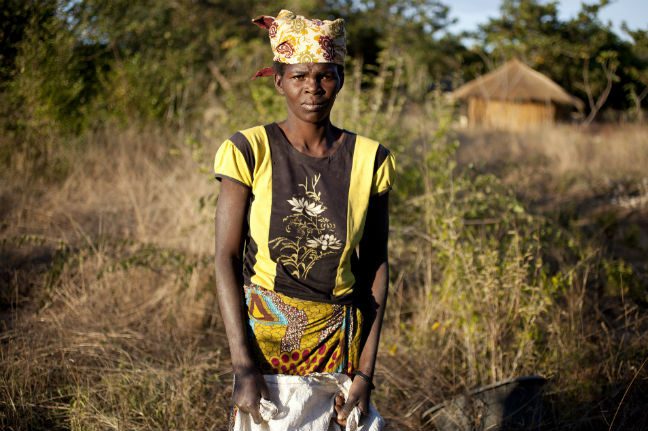
By Amy Christian, Audio-Visual Coordinator, Oxfam Australia.
When Amy Christian visited Mozambique, she met Tereza and her family. Tereza is the sole provider for her family and finds it difficult to provide for her family not knowing where the next meal will come from. Read her experiences and find out how you could change someone’s life.
Standing in the open space of Tereza’s home I’m acutely aware of the quiet, the peace, the sound of nothing that surrounds us. It’s warm but not hot. The sun is slowly fading and the wind is picking up slightly as it prepares for another cold winter night.
Tereza stands up from her work and stares into the distance, she’s tall, statuesque and elegant in her worn and dirty clothes. The golden sunlight touches her cheeks, lays itself softly over her angular cheekbones and rests on the tips of her eyelashes. I follow her gaze and see nothing but trees, thick bush and sand that go on forever and ever.
Tereza’s only neighbour is her mother-in-law; since her husband died she has lived alone with her four children. At night they sleep in a small round hut with mud walls and share just one blanket between them. The kitchen, under a tree in the centre of the clearing, is a fire made of logs, stones, and one tin pot. Another tree holds a makeshift shelf where cutlery, plates and knives are stored. Life here is very basic; Tereza lives from day to day not knowing where the next meal will come from.
I twist my bare feet in the sand where I stand; I bury my toes and feel the cold underneath. I wonder how anything can grow in sand. I’ve seen gardens here like an oasis in the desert and each one seems like a miracle.
Tereza turns to me and slowly smiles, her eyes give away the pain of her thoughts. Bending over she picks up a long stick and begins to beat the bag of grass by her feet. It sounds like a delicate drum – rhythmic and certain.
The seeds that fall from the grass are her children’s dinner tonight.
“I would like to be able to give my children bread and tea. I know they would like those things but I don’t have the money to buy those things for them.” Tereza tells me.
Tereza has a field in which she grows maize but it isn’t enough to last her all year. When food runs low she turns to burning charcoal and selling it by the side of the road to make ends meet. Making charcoal is tough work and it’s making Tereza sick. She tells us she has pains in her joints and coughs all the time.
I fight an overwhelming sadness by talking to Tereza. I ask about her life, about hunger, about survival here in the dry lands of Mozambique. She answers thoughtfully, her voice a whisper as she tells me about her lost husband, her children, and how she’s never eaten anything that tastes good.
“This year it didn’t rain throughout the year and I didn’t have any food so I had to carry a bag of charcoal to the road side to sell. The problem is no one bought that bag of charcoal within a week so the shop keepers refused to give us another loan. I had to come back home and sleep hungry.
“Sometimes, when I haven’t had enough food the previous night and I have to plough the field, I am not able to because my stomach is aching and I feel dizzy when I bend over. If I drink water, it causes pain in my stomach because drinking water on an empty stomach makes me want to vomit and I have to give up.”
The sun continues to fade, dimming the light and telling us we have to leave. I reach out to Tereza and hug her thin frail body against mine. She smiles and thanks us for coming. I know this is the last time I will ever see her.
As we leave I turn back and see Tereza wave and smile. I wave back. Tereza has just been selected to join Oxfam’s project in the area, she will soon receive tools and seeds and access to a small garden where she will be able to grow nutritious food for her children. She will also receive goats which will provide her with another income and help her survive the hardest times of year, when her crops have run out and the charcoal doesn’t sell.
Life here is tough; but small things can make a big difference to families like Tereza’s.
Help grow a garden in the desert and stop hunger in Mozambique
